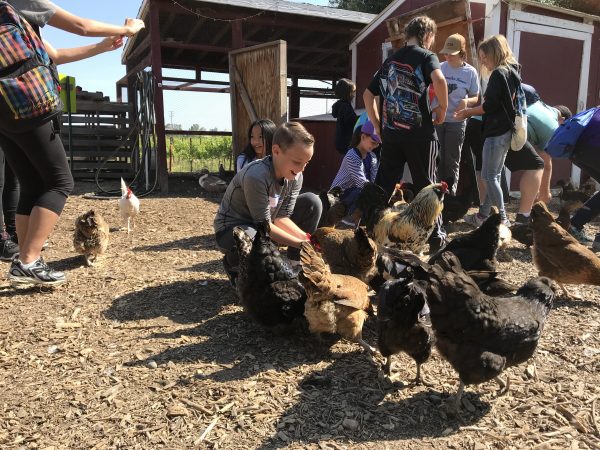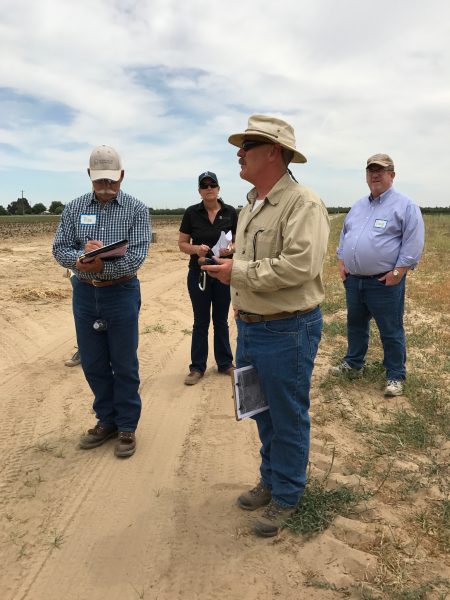Lending group sponsors California Farmland Trust, which has protected 16,170 acres to date

The California Farmland Trust (CFT) had its humble beginnings in 1993 when two Merced County farmwomen were commiserating at the kitchen table that development was coming ever closer to their farms. But instead of just grumbling, they decided to take action to preserve agriculture, and from that meeting the Merced County Farmland and Open Space Trust was formed.
Over the years, several other farmland trusts have merged together to form the CFT, which collectively has ensured that 73 farms in the Central Valley and neighboring Contra Costa County totaling 16,170 acres of prime farmland will remain in agriculture forever.
Farm Credit has been a proud Farmland Heritage Sponsor for the organization since 2014 and looks forward to continuing supporting CFT in its vital mission of protecting prime farmland forever, said Leili Ghazi, chair of the Farm Credit Alliance and Senior Vice President of the Farm Credit Banking Group for CoBank.
“Farm Credit has provided agriculture and rural communities with a dependable source of credit for more than a century, helping to keep California’s farmers feeding the nation and the world,” Ghazi said. “We are proud to have played a role in helping CFT and its predecessor organizations protect this rich farmland because we firmly believe the state’s prime farmland must be preserved. We salute CFT for its efforts to date and know it will continue doing this vital service for years to come.”
The Elk Grove-based CFT currently works in Sacramento, San Joaquin, Stanislaus, Contra Costa, Madera and Merced counties, said Charlotte Mitchell, who has served as the Executive Director since 2017. She said CFT focuses on protecting the most important farming regions from development.

“We are particular about the land we protect. We realize that people do need places to live, but they also have to eat,” she said. “So we ask, Does the land have prime soils with a high capacity to grow things? Does it have a reliable water source? And does it have a real threat of being converted to other purposes?”
There is strategy involved as well. For example, land placed in trust in Contra Costa County is generally aligned along the east edge of the town of Brentwood, discouraging development from moving into rich farming areas.
Farmland trusts place easements on land that remove the right to develop it. In return, farmers are compensated for the reduction in the fair market value of the land. If the current value of the property is $25,000 an acre, it might only be worth $20,000 an acre with the development rights removed. So on a 100-acre farm, the reduction in property value would be around $500,000, which would be paid to the landowner.
The farmer retains ownership, the ability to pass on the property to family members and the right to grow any crop within the existing capabilities of the property.
Mitchell said CFT’s goal is to have 20,000 acres covered by easements by the end of next year, and while open to requests for easements in other parts of the state, focuses primarily on its core service territory. She noted that Marin and Yolo counties in particular have strong farmland trusts so there’s no need for CFT to work in those areas.
The bulk of the project funding comes from various federal and state agricultural protection programs. But Mitchell said sponsorships such as Farm Credit’s are vital to the success of the organization.
“While we have funding for our projects, we can’t use that funding for operations. Our sponsors’ support allows us to keep the lights on and the phones working, and we can’t do our job without that support,” she said.
“We really appreciate Farm Credit’s continuing and consistent support over the years. They have been strong partners in our quest to protect prime farmland, and we’re very grateful for that.”
###
About Farm Credit:
American AgCredit, CoBank, Farm Credit West and Golden State Farm Credit are cooperatively owned lending institutions providing agriculture and rural communities with a dependable source of credit. For more than 100 years, the Farm Credit System has specialized in financing farmers, ranchers, farmer-owned cooperatives, rural utilities and agribusinesses. Farm Credit offers a broad range of loan products and financial services, including long-term real estate loans, operating lines of credit, equipment and facility loans, cash management and appraisal and leasing services…everything a “growing” business needs. For more information, visit www.farmcreditalliance.com.
About the California Farmland Trust: The California Farmland Trust is a California Non-Profit 501(c)(3). Our mission is to help farmers protect the best farmland in the world. To date we have protected 16,170 acres of farmland on 73 family farms. Visit us: www.cafarmtrust.org.






